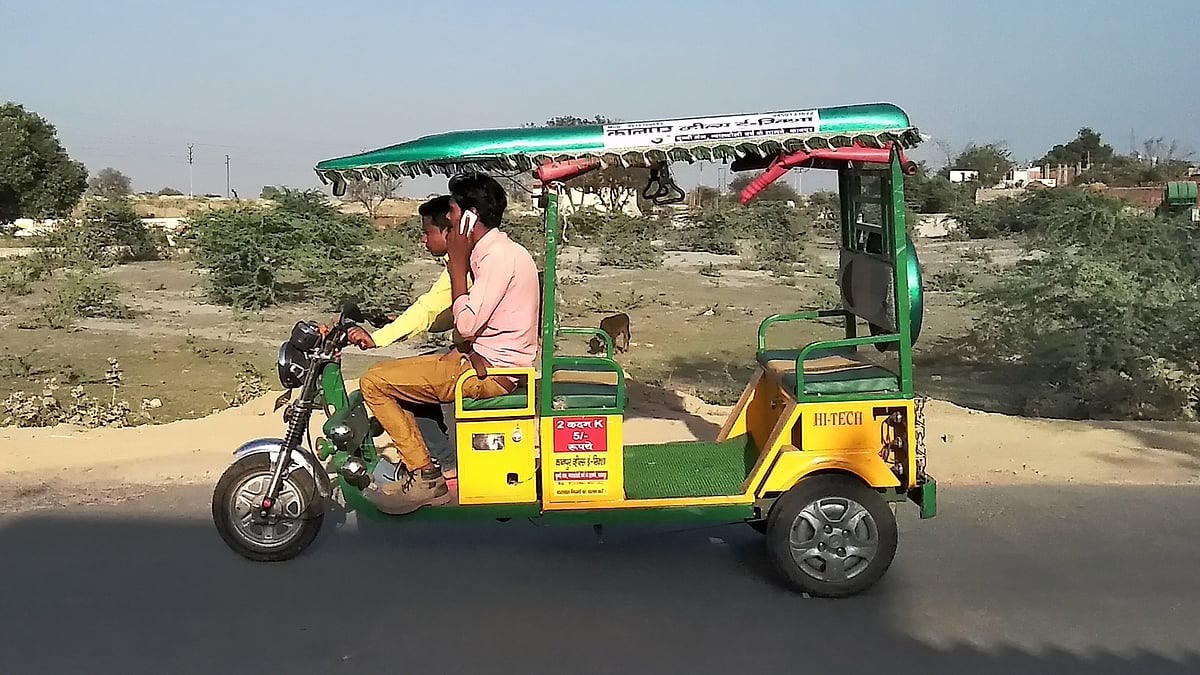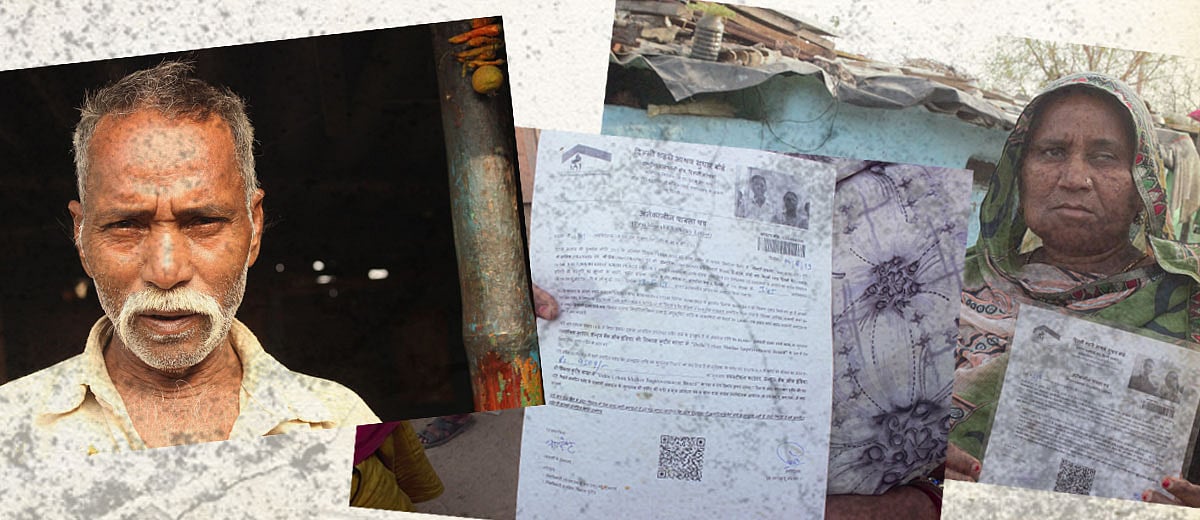Power theft, ‘illegal’ charging, no safety: Inside Delhi’s e-rickshaw chaos
Two electrocution deaths reveal the dark underbelly of Delhi’s e-rickshaw scheme.
It had been less than a year since Deepu switched gears from driving someone else’s vehicle to owning and operating his own e-rickshaw in northeast Delhi’s Mandoli. It was a fresh start for him – a chance to be his own boss after a long career of driving for others, a chance for freedom.
Using his life’s savings, Deepu made a down payment on an e-rickshaw, committing to an EMI of around Rs 12,000. He was excited by the prospect of working on his own terms, in his own neighbourhood, without endless days away from his two young children, wife and mother.
After all, he thought, he finally owned his own vehicle.
It wasn’t easy.
In early July, Deepu took a loan of Rs 20,000 on 12 percent interest to pay off his remaining EMIs, a desperate move to escape from relentless agents from the finance company who harassed him whenever there was a delay in payment. Just when he thought he could breathe easier, tragedy struck on a quiet Thursday afternoon.
On September 5, Deepu took his e-rickshaw to a nearby garage to charge it, something he’d done countless times before. The garage doubled up as a parking space for his vehicle as well – a familiar space. But at approximately 1.30 pm that day, Deepu was electrocuted while charging his e-rickshaw. He was taken to GTB Hospital where doctors declared him dead on arrival.
“We saw in the CCTV footage that Deepu took the e-rickshaw inside. After some time, the gate automatically opened but he never came out,” said his elder brother Sonu, still in shock. Sonu had rushed to Delhi from Gurugram when hearing the news.
“I saw his body after the postmortem. It’s hard to believe he died from electrocution,” Sonu told Newslaundry. “We have been demanding the CCTV footage from inside the garage.”
The Harsh Vihar police registered a case under a section 106 of the Bharatiya Nyay Sanhita for death due to negligence, and the investigation is ongoing. Crucially, Deepu’s family alleges the garage is “illegal” and demand that its owner be arrested.
An e-rickshaw boom
Deepu lived with his wife, mother and two children – a five-year-old son and a six-year-old daughter – in a two-room house in Pratap Nagar in Harsh Vihar. His mother lost her vision a few years ago and has diabetes, so needs constant care.
The garage where Deepu died is located just 700 metres away from the house. When Newslaundry visited it days after Deepu’s death, its doors were locked. It’s owned by one Heera Singh, but Newslaundry could not trace him.

Deepu’s wife (in yellow) after his death.

The house where Deepu lived with his wife, two children and mother.
Until recently, it was a hive of activity, a parking and charging hub for 10 to 15 e-rickshaws. Sonu explained that there’s no space for e-rickshaw drivers like Deepu to park their vehicles in the area’s narrow lanes, so they relied on garages, paying Rs 120-150 per day to both park and charge.
But most of these garages operate without commercial metres, according to local drivers. Instead, they allegedly syphon money from domestic connections.
“The owners make easy money,” said Harsh, an e-rickshaw driver in Harsh Vihar. “They just give you a plug to charge your rickshaw but no one knows if the wiring is safe or if the metre can handle the load. We take on all the risks.”
Delhi has approximately 1.6 lakh e-rickshaws, according to this report by PTI, though only 50,000 are officially registered with the transport department. Drivers point out that the move towards e-rickshaws was pushed by the Delhi government, which launched the Electric Vehicles Policy in 2020, which provided a subsidy of Rs 30,000 to purchase an e-rickshaw. The government hopes that a quarter of all new vehicle registrations by this year will be electric vehicles.
Within two years, over 28,000 e-rickshaws were registered in comparison to just 16,989 before the policy was launched. India’s e-rickshaw market is estimated to be worth US $1.15 billion in 2024, and projected to grow to $2.81 billion by 2029.
But a government official told PTI that “over 60 percent” of the capital’s e-rickshaws are “involved in power theft” as a result of illegal charging facilities.
As of 2022, Delhi has 2,452 public and semi-public charging points across 1,919 locations. While the government claims an EV to public charger ratio of 25:1, it’s likely to be much higher since many e-rickshaws are still unregistered.
Harsh said there are “dozens” of “illegal” charging and parking points in Harsh Vihar and Mandoli which do not have necessary commercial permits and ignore safety regulations.
“None of them have commercial licences. This is just how things work here,” Harsh claimed. “There are no legal charging stations in this area that we know of. I’ve heard that even if you go to a proper charging station, they ask for biometrics. Who wants to go through all that hassle?”
Owners of these charging points were unwilling to speak to this reporter.
Power theft
About 22 km from Deepu’s home, in CA Block in Shalimar Bagh, a child was electrocuted to death on August 21 when he accidentally touched an e-rickshaw at an illegal charging station near a public toilet.
Seven-year-old Suraj and his family had been visiting his aunt’s home in the CA Block slum to celebrate Raksha Bandhan. While returning from the public toilet, located just a few metres away from his aunt’s home, he inadvertently touched the charging e-rickshaw and received an electric shock. He collapsed and was rushed to a nearby hospital, where he was declared dead.
Locals told Newslaundry that the area is home to around 150-200 e-rickshaws, most of which were purchased in the last two or three years. “It’s become so easy to buy an e-rickshaw these days,” said Sanjay Singh Pal, who lives nearby. “With Rs 20,000 to Rs 30,000 in hand, companies will give you an e-rickshaw on finance. That’s how people get them here.” EV manufacturers mentioned in the Delhi government’s Electric Vehicles Policy can be found here.
Pal said that with a little more cash – a bribe, in other words – it’s easy enough to secure all the necessary paperwork including a fitness certificate, licence and pollution clearance.
Even Suraj’s uncle, whose home he was visiting when he died, drives an e-rickshaw. Suraj’s aunt Mamta told Newslaundry they bought the e-rickshaw four years ago after her husband left his job as a construction worker.

E-rickshaws charging in the area, while children play inside them.

The public toilet near which Suraj was electrocuted.
“Construction work was too inconsistent. There were months with no work,” she said. “One day it’s because of pollution, the next it’s some issue with contractors. So my husband quit and bought this e-rickshaw. At least now we earn regularly.”
An e-rickshaw driver can earn around Rs 800 per day, Mamta said, but only if there’s no EMI to worry about.
“If you pay in cash, an e-rickshaw costs about Rs 1.5 lakh to Rs 1.75 lakh. But if you go through financing, it can cost up to Rs 2.5 lakh,” she said, adding that they paid off all their EMIs in just a year and a half.
As Newslaundry spoke to Mamta, the e-rickshaw was hooked to a charging point outside that is connected to the house’s domestic electricity supply.
“Nothing will happen,” she said confidently. “The wire we use is in good condition and our connection is stable. Whereas this wasn’t the first time someone got an electric shock from the e-rickshaw where Suraj died. They use poor quality wires for charging and overload their connections to charge multiple vehicles.”
As this reporter walked through the slum, we counted at least 20-25 e-rickshaws being charged using domestic power connections as children played inside or near them. Drivers told Newslaundry that charging an e-rickshaw at home costs between Rs 2,000 and Rs 2,200 a month – a fraction of what they’d pay with a commercial metre. An e-rickshaw will run about 70 to 80 km after charging for two hours.
“I use a strong cable to charge my vehicle. Anyone, from kids to the elderly, can sit here while it’s charging. Nothing will happen,” said Sukhwandar, another e-rickshaw driver in the slum. With no proper parking, Sukhwandar has run a wire from his home to where he parks his vehicle on the road, creating his own makeshift charging point.
“This is how most of the vehicles here get charged. There’s no safety,” Pal remarked, his frustration palpable. “Everyone knows they all use domestic metres. But nobody takes action. If they installed commercial metres, you’d see everything stop overnight.”
And for Deepu's family, there is no solace.
“It’s clear the garage was illegal, and my brother died there. Why haven’t the police arrested the owner yet? There is no justice for the poor,” Sonu said.
Ground reports like these take time and resources. Help us tell more stories. Click here to subscribe to Newslaundry and The News Minute, and support journalism in public interest.
 Exactly how environment-friendly are Delhi’s e-rickshaws?
Exactly how environment-friendly are Delhi’s e-rickshaws? No water, no electricity, no homes – Delhi government fails to rehabilitate its slum-dwellers
No water, no electricity, no homes – Delhi government fails to rehabilitate its slum-dwellersNL Digest
A weekly guide to the best of our stories from our editors and reporters. Note: Skip if you're a subscriber. All subscribers get a weekly, subscriber-only newsletter by default.
